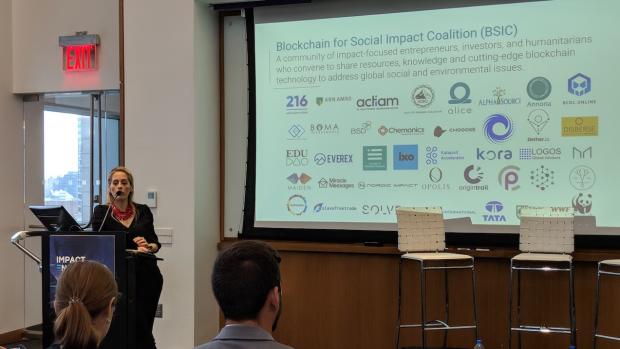Impact.Engineered Brings a Global Audience to Tandon
ASME and Engineering for Change Find a Fitting Venue Here in Brooklyn

Impact.Engineered, a forum for recognizing and amplifying the role of engineers’ curiosity, rigor, and diligence in solving global challenges, took place at NYU Tandon on October 11, 2018.
In 2015 the U.N. outlined 17 Sustainable Development Goals focused on eliminating poverty and hunger, ensuring global health, promoting peace, and other vital aims. Each September, world leaders gather at the organization’s headquarters in New York City to discuss progress and set agendas, and this year, in the wake of several devastating floods, wildfires, and storms, the issue of climate change was on everyone’s mind.
Members of the American Society of Mechanical Engineers and the international group Engineering for Change have joined forces to celebrate the role that engineers are playing in addressing climate change and other vital global problems. In October, not long after the 73rd session of the U.N. General Assembly, they held a high-profile event they dubbed “Impact. Engineered” at Tandon’s newly renovated 370 Jay Street facility.
Throughout the day, the space bustled with young activists, seasoned change makers, and others working to solve the world’s problems through engineering ingenuity and creativity.
“The high-level conversations that take place [at the U.N.] — whether about climate change or sustainable development — often boil down to ‘how much’ or ‘how many.’ ‘How much renewable energy does one country promise to produce by 2030?’ ‘How many billions (or trillions) of dollars are needed to achieve these goals?’” the organizers explained. “What is noticeably absent from these conversations is the question of ‘how’ period. How has always been the question that engineers exist to take on. Fortunately, it is one they are increasingly tackling with the express purpose of enabling human development and improving the welfare of the planet.”
Tandon’s Dean Jelena Kovačević welcomed the large audience to the event, pointing out that the school and Impact.Engineered’s organizers have many goals in common, including using engineering to create positive social change in the world, for all people. “Impact.Engineered is amplifying the role of engineering in navigating life-altering global changes, and for that, the entire engineering community is grateful,” she said. “At Tandon, we share that responsibility. Our goal is to create a space that provides students with the opportunity to think outside the box and create tomorrow’s solutions today.”
Amidst a variety of panels and discussions on topics ranging from the power of blockchain technology to the possibilities of small-batch manufacturing, one session, “Disrupting Engineering Education,” made plain some of the ways in which Tandon was shifting the paradigm for aspiring, young engineers. Among the speakers on the panel was Benedetta Piantella, an Industry Assistant Professor in the Department of Technology, Culture, and Society’s Integrated Digital Media Program, who explained the need for highly skilled engineers and designers capable of understanding the socioeconomic and geopolitical factors that should be informing their work. “My class might be their first exposure to Design Thinking, and while they may want to immediately tackle problems they’ve read about in sub-Saharan Africa, there are time constraints in a one-semester class and a limit to how much they can contribute on a practical level,” she said. “I like them to think locally at first. Their immediate community needs them too, and they can accomplish a lot and get plenty of field experience by looking in their own backyards.” (Besides hearing from Piantella, attendees got to experience the school’s entrepreneurial, socially engaged spirit with tours of the MakerSpace and Future Labs held throughout the day.)
It was, by all accounts, an inspiring event that introduced Tandon to a new international audience and left participants reinvigorated and ready to change the world.
ASME Returns for a Look at 3D Printing
The day after Impact.Engineered, another ASME-sponsored event came to NYU Tandon: this one a fascinating presentation on 3D printing, which at a commercial scale is also called additive manufacturing (AM). (AM is currently one of the fastest-growing segments of industry, expected to reach $16 billion globally by next year.)
The event opened with doctoral student Fei Chen, who works with Professor of Mechanical and Aerospace Engineering Nikhil Gupta, and in her presentation, she discussed the cybersecurity challenges posed by the AM process chain and technology. She was followed by Industry Assistant Professor of Mechanical and Aerospace Engineering Rakesh Kumar Behera, who explained a range of AM methods, including one called direct energy deposition, which allows metal to be “printed” by firing a laser beam at metal powders, causing them to coalesce under the head of the beam into a single laminate. (The powder left over can be saved for reuse.)
Together, the duo presented a multi-faceted look at a topic that is revolutionizing manufacturing — and becoming a major focus for Tandon researchers.




